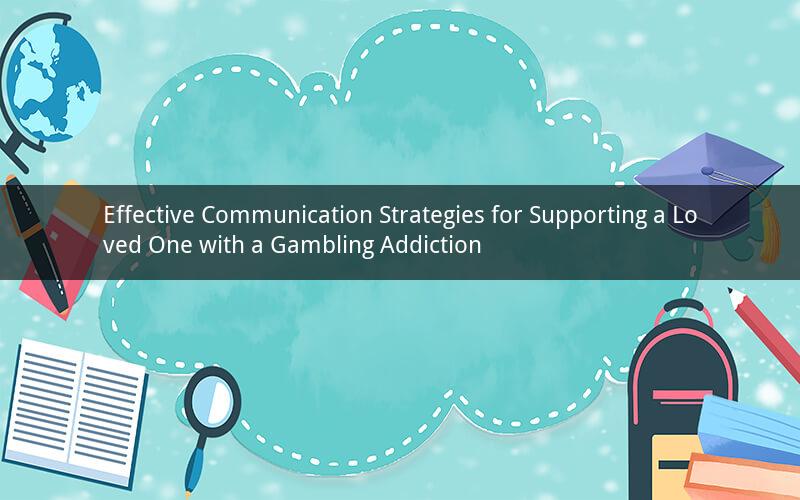
Gambling addiction is a complex issue that affects individuals and their families. When someone you care about is struggling with a gambling addiction, it can be challenging to know how to support them. Effective communication is crucial in helping them overcome their addiction. This article explores what to say to someone with a gambling addiction, offering insights and strategies for fostering a supportive environment.
1. Acknowledge Their Struggles
It's important to acknowledge the struggles your loved one is facing. Let them know that you understand the challenges they are going through and that you are there to support them. You can say, "I see how difficult this must be for you, and I want to help you through this tough time."
2. Express Your Concerns Without Judgment
When discussing their gambling addiction, it's essential to express your concerns without judgment. Avoid shaming or blaming them, as this can make them defensive and less likely to seek help. Instead, say, "I'm worried about you and the impact of your gambling on your life. I want to understand what you're going through and how we can work together to find a solution."
3. Encourage Them to Seek Professional Help
Encourage your loved one to seek professional help from a therapist or counselor specializing in gambling addiction. You can say, "I believe that seeking help from a professional can make a significant difference in your recovery journey. They can provide the support and guidance you need to overcome this addiction."
4. Offer to Attend Therapy Sessions
Let your loved one know that you are willing to attend therapy sessions with them. This can help build trust and create a supportive environment for their recovery. You can say, "I want to be there for you during this process. If you're comfortable, I'd like to join you in therapy sessions to offer my support."
5. Encourage Open Communication
Encourage your loved one to express their feelings and thoughts openly. Create a safe space where they can share their struggles without fear of judgment. You can say, "I'm here to listen to you and understand your experiences. Please feel free to share anything that's on your mind."
6. Help Them Develop a Support System
A strong support system is crucial for overcoming a gambling addiction. Encourage your loved one to connect with others who have experienced similar challenges. You can say, "Consider joining a support group or finding a mentor who can provide guidance and encouragement during your recovery journey."
7. Set Boundaries and Expectations
It's important to set boundaries and expectations to protect yourself and your loved one from the negative consequences of their addiction. You can say, "I understand that this is a difficult process, but I need to establish some boundaries to ensure both of our well-being. We can work together to find a balance that supports your recovery."
8. Be Patient and Understanding
Recovery from a gambling addiction is a long and challenging process. Be patient and understanding as your loved one navigates their journey. Avoid pressuring them to recover at a pace that is unrealistic for them. You can say, "I know this is a slow process, and I'm here to support you every step of the way."
9. Celebrate Progress and Small Wins
Recognize and celebrate the progress your loved one makes, no matter how small. This can help maintain motivation and encourage continued recovery. You can say, "I'm proud of the progress you've made so far. Let's celebrate this small win together."
10. Continue to Support Them
Support for someone with a gambling addiction doesn't end once they have overcome their addiction. Continue to be there for them, offering your love and understanding as they navigate life without gambling. You can say, "I'm committed to supporting you long-term and celebrating your continued success."
Questions and Answers:
1. How can I help my loved one understand the severity of their gambling addiction?
Answer: Share your concerns about the negative consequences of their addiction and encourage them to seek professional help. Provide examples of how their gambling is affecting their life and the lives of those around them.
2. What if my loved one refuses to seek help?
Answer: Be patient and persistent in your efforts to support them. Offer resources and information about professional help, and express your willingness to attend therapy sessions with them. Remember that recovery is a personal journey, and your loved one may need time to come to terms with their addiction.
3. How can I support my loved one during their recovery without enabling their addiction?
Answer: Set boundaries and expectations to protect yourself and your loved one from the negative consequences of their addiction. Encourage them to take responsibility for their actions and make positive changes in their life.
4. What should I do if my loved one relapses?
Answer: Stay calm and supportive. Encourage them to reflect on the reasons for the relapse and discuss strategies to prevent future relapses. Remember that relapse is a common part of the recovery process, and it's essential to maintain hope and continue supporting your loved one.
5. How can I maintain my own well-being while supporting someone with a gambling addiction?
Answer: Seek support for yourself, whether it's through therapy, support groups, or confiding in trusted friends and family members. Establish boundaries to protect your own mental and emotional health, and remember that taking care of yourself is crucial for being an effective support system for your loved one.